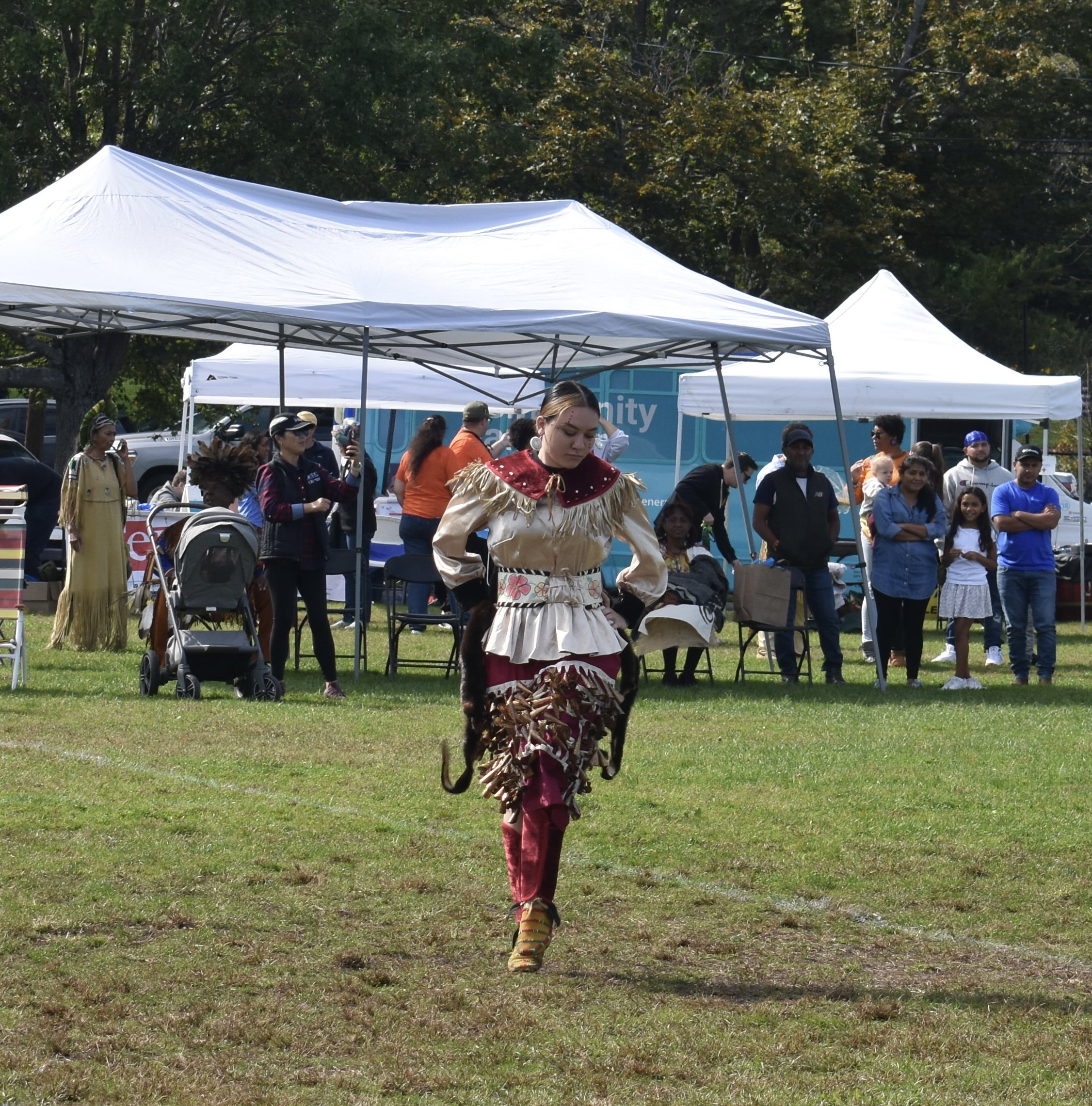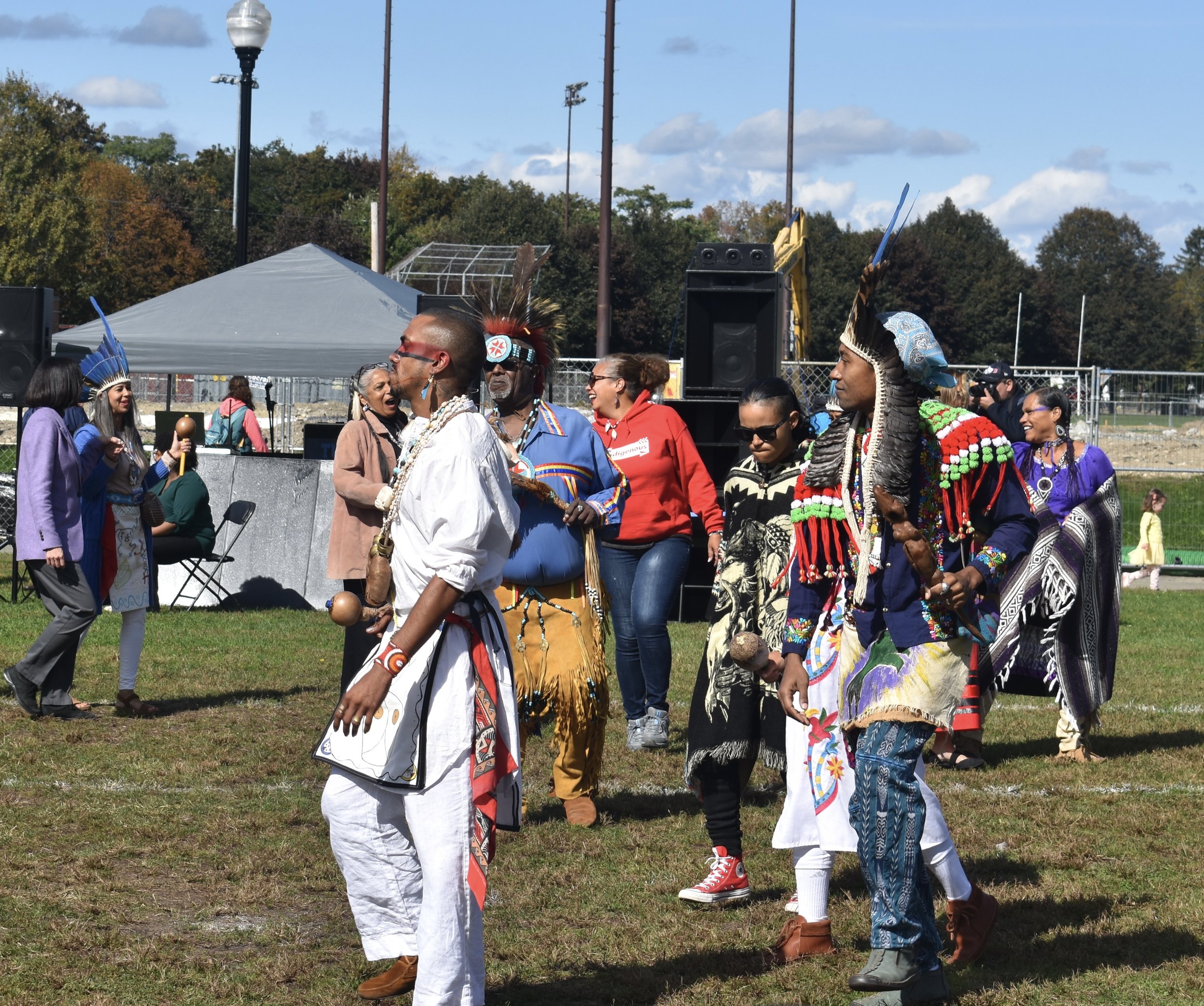Photo courtesy of Madhavi Rao ‘24. Attendees of the ‘Honoring the Ancestor’ event, which involved communal music, pose for a photo.
By Emma Quirk ’26 and Madhavi Rao ’24
Photos Editor & Staff Writer | Staff Writer
To celebrate Latinx Heritage Month and Indigenous Peoples’ Day, the Office of Diversity, Equity and Inclusion sponsored multiple events including, “Honoring the Ancestor, Gloria Anzaldúa: Joy, Love, And Liberation featuring Latinx Writers” and a field trip to the third annual Indigenous Peoples’ Day Ceremonial Celebration in Newton, Massachusetts.
Irene “I-SHEA” Shaikly, a performance and teaching artist described as an advocate for social systemic change, was invited to lead “Honoring the Ancestor.” The event, organized by Assistant Director of Diversity Programming and LGBTQ Resources Nohelya Zambrano Aguayo ’21, took place over lunch on Friday, Oct. 6, at the Unity Center.
Mount Holyoke College staff, faculty, and current and prospective students gathered in the space to pay respects to Gloria Anzaldúa, an American scholar of Chicana feminism, cultural theory and queer theory who centered LGBTQ+ people of color in her work.
Before the celebration, participants were treated to Mexican food with options including mole, tortilla chips, plátanos, rice, beans, guacamole, salsa and Jarritos. Attendees were given complimentary copies of “The Gloria Anzaldúa Reader” and some of Anzaldúa’s books, including “Borderlands/La Frontera: The New Mestiza”.
I-SHEA, surrounded by an array of various colorful and unique instruments, began the event with a song dedicated to Anzaldúa. She created space to remember the ancestors who paved the way for queer communities of color. Everyone in the Unity Center picked an instrument from I-SHEA’s extensive collection, forming a musical circle. Instruments ranged from ocean drums, hand-pans and sound bowls to maracas and Ghanaian gourd shakers.
As everyone settled in, I-SHEA instructed one individual in the group to begin playing their instrument. In their own time, each person in the group started playing, each sound layering onto the next until every instrument’s sound rang out within the circular room.
The music reverberated until the person who began the sound circle decided to stop playing their instrument. Everyone in the circle consecutively ceased playing until the room was once again silent. “The feeling of sitting and listening to the collective noise generated is indescribable,” Sara Abubo ’25 said. “Truly I could feel it in my spirit.”
After the circle, I-SHEA created space for people to name loved ones they would like to remember and ancestors whose power needed to be honored. “When you call ancestors and spirits, they listen, and they come,” Abubo said. “I definitely felt a presence of some higher power, whether it be ancestors, spirits, or maybe just everyone’s energy together in the room, but it was there.”
Next, I-SHEA opened the musical circle again, allowing attendees to enter and exit, playing their instruments in a building sequence as the room once again resonated with sound and eventual silence. When the second circle closed, I-SHEA encouraged people to write about their experiences in the space, what they learned and how they felt connected. The prompt she offered was, “The truth is…”
After reflecting on the activity, I-SHEA invited everybody in the room to write unaddressed love letters to another person in the room. These love letters were collected, put into a basket and passed around the circle until everyone had a letter they did not write.
To end the event, I-SHEA went around the circle, asking people to share their challenges and areas of growth and to read their love letter aloud. “It's always surprising the level of vulnerability that can be achieved when people come together for events like this,” Soleil Doering ’24 said.
Students present felt that the event cultivated a sense of love, appreciation and warmth among the group. “Overall, it was an amazing experience that is hard to put into words that convey the enormity of the feelings generated,” Abubo said. “You just had to be there.”
The community reflection did not end there. On Oct. 9, Mount Holyoke staff and students joined a crowd of hundreds of native and non-native folks at Albemarle Field in Newton, Massachusetts, to celebrate Indigenous Peoples’ Day.
Zambrano Aguayo, Krysia Villón ’96 and Vice President for Equity and Inclusion Kijua Sanders-McMurtry organized the trip, while Zambrano Aguayo and Graduate Assistant Katie Dick ’21 led it. Villón is the owner of Chiqui’s Kitchen — a restaurant dedicated to making Peruvian-style empanadas and honoring her Peruvian-Quechua-American heritage — and one of the founders of the celebration.
“[The Office of DEI] had just received a grant for Indigenous-focused programs and resources, and knew we wanted to use some of it to sponsor the celebration, take our students, and honor Krysia’s labors and talents,” Zambrano Aguayo said.
The event’s opening ceremony included the Four Directions Prayer, an intertribal song and dance intended to honor ancestors, and speeches from elders and tribe leaders. Immediately afterwards, students were treated to a complimentary lunch from Chiqui’s Kitchen. Throughout the day, Indigenous leaders spoke, led prayers, sang and danced. The event featured pow-wow style performances, intertribal dances and social dances where all attendees were invited to participate.
Photos by Emma Quirk ‘26. (Left) A jingle dancer, pictured above, does a pow wow dance at the Newton’s third annual IPD Celebration.
(Right) People participate in an intertribal dance at the Indigenous People’s Day Celebration in Newton.
The ceremony allowed participants to connect with nature as well as with one another. “I felt so present, connected and grateful throughout,” Zambrano Aguayo said. “[The opening] land acknowledgment connected all of us in the field to be present with one another and Mother Earth. From there on, it was clear that Indigenous knowledge would be valued and centered, which isn’t typical in most higher academia spaces like MHC.”
Several tribal elders and leaders — including of the Narragansett and Wampanoag Nations — gave speeches before the crowd. A significant moment for Peters was “when the Chiefs were reading about how the land was taken away from us and what they are trying to do to get some back.” After the celebration, they felt “encourage[d] that there are so many people working towards change.”
Attendees could purchase Indigenous food and art from local vendors, as well as interact with nonprofit organizations that had tents set up around the field.
Leaders spoke about their love for their communities alongside initiatives such as taking care of the Earth, fighting for a permanent reservation for the Nipmuc people and pushing for a new Massachusetts state motto and an updated state seal. A commission of lawmakers, indigenous representatives, historians and others was created in 2021 to change the state seal and motto, which have been “condemned as racist,” according to WBUR. This negotiation is currently in progress.
Newton Mayor Ruthanne Fuller and state Senator Ed Markey were in attendance and gave remarks. They both spoke in support of Indigenous Peoples’ Day and local native people and communities.
Markey shared the same sentiments in his speech on X, formerly known as Twitter. “Today — and every day — I am with native people in the fight for sovereignty, land rights, and environmental justice.”
Overall, the event was a positive experience for attendees. “It was so validating for us to all resist white supremacy in engaging with the music, dances and cultures of various Indigenous people, supporting Indigenous food and art vendors, and actively listening to Indigenous people speak throughout,” Zambrano Aguayo said.
“I always go to Pow Wows to celebrate our heritage and culture and this was another opportunity to celebrate,” Peters said. “I felt included, accepted and honored.”
Editor’s note: Madhavi Rao ’24 is a member of Mount Holyoke News.



